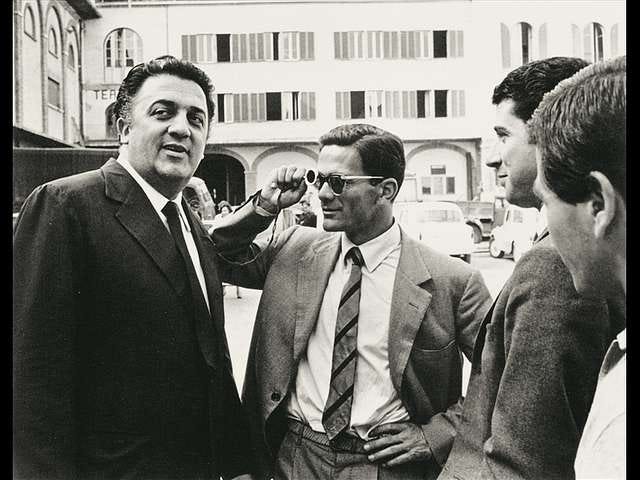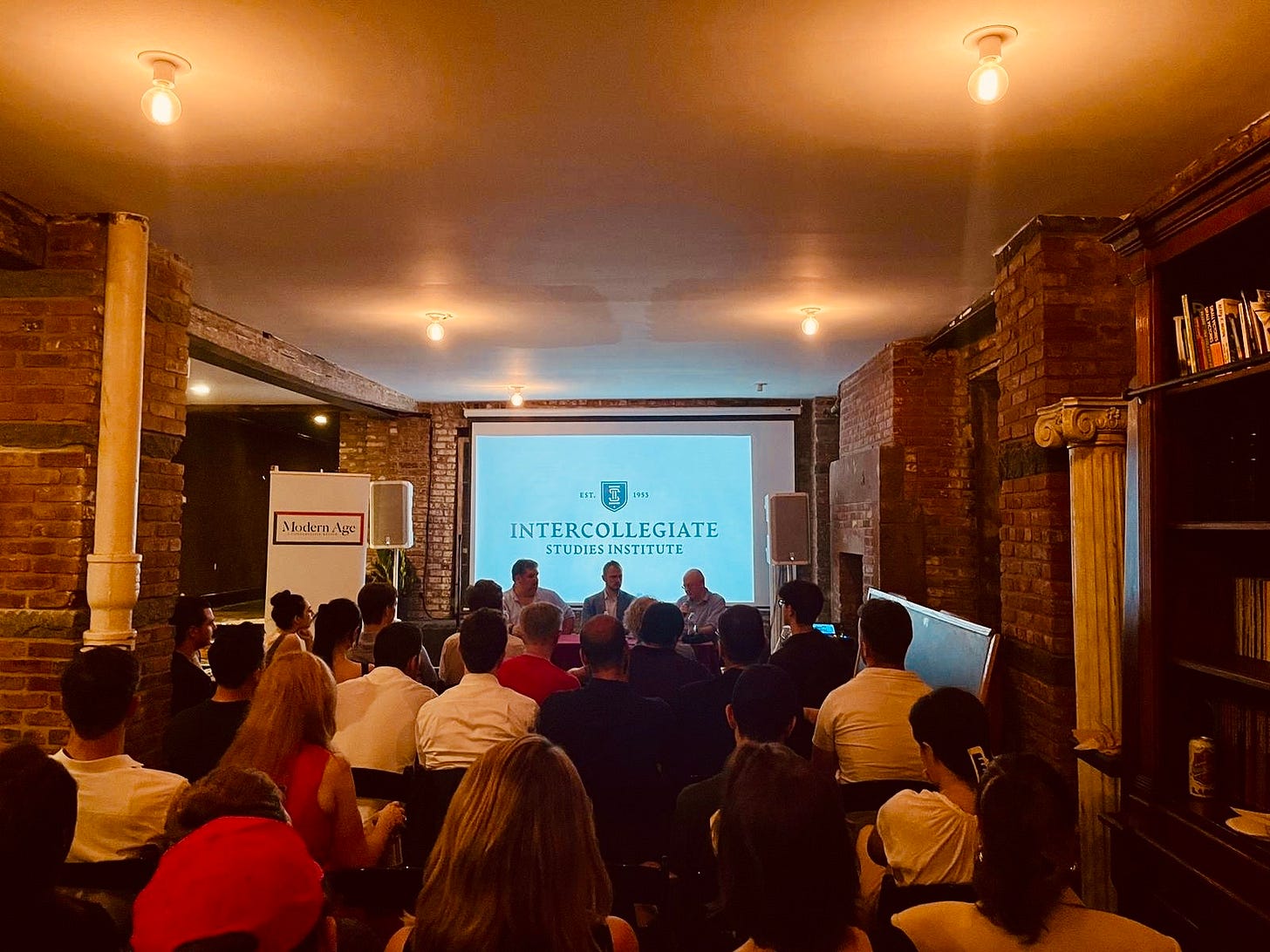To say that it’s been a hell of a week would be an understatement. The image of the former president pumping his fist in the air with blood streaming out of his ear has already become iconic in less than a week, spawning the mimetic trend among his supporters of covering their right ear with a patch in solidarity.
Just a few days before the shooting, I stumbled upon an old clip of him giving dating advice alongside fellow larger-than-life performance artist Wendy Williams on her show back in 2013. Say what you will about the consistency of his politics, but the man remains as much a master showman as he was in his days on The Apprentice, WWE, and films and sitcoms on which he made cameos in the early aughts. I still maintain that in order to understand his political career, we must contend with the fact that he is one of the greatest aesthetic geniuses—and along with Zizek, that he is the prime postmodernist–of our time.
Oh, and on top of all that, he also picked his running mate this week.
This Week at Compact
Our coverage of J.D. Vance this week included a piece by Modern Age editor Daniel McCarthy, who compares the criticism of the Trump-Vance ticket to that of paleoconservatives like Pat Buchanan in the post-Cold War era: “The same hyperbole that characterizes denunciations of Trump and Vance today was typical of how movement conservatives and triumphant liberal internationalists talked and wrote about the Buchananite right in the 1990s.”
Compact’s summer interns were in attendance at the Modern Age’s discussion panel earlier this week featuring McCarthy, Michael Brendan Dougherty, and Johnny Burtka. Echoing McCarthy’s piece, the panel covered the Right’s shifting attitudes toward foreign policy. On this issue, Trump’s (and Vance’s) positions embody something of a throwback to the era before the Republican party was taken over by interventionists and free-trade ideologues.
Zaid Jilani addresses the default leftist critique that Vance’s current embrace of Trump, given his past criticisms of him, makes him “a cynic and a con man willing to do anything for power.” Jilani argues that “making compromises for power isn’t always malicious. In our political duopoly, you have to endorse one set of leaders or another in order to do anything constructive.” He went on to list numerous occasions in which Vance joined forces with Democrats to champion working-class causes.
In response to the assassination attempt, Compact’s founding editors Sohrab Ahmari and Matthew Schmitz called into question the legitimacy of the claim that the former president incites “stochastic terror,” which they define as “a phenomenon said to arise when a political leader creates an atmosphere of fear or hatred so intense that it tends to lead to violence, even without any direct call to violent action.” While they concede that many are rightly “calling for a de-escalation in political rhetoric,” they challenge his detractors to practice what they are so keen on preaching: “a true de-escalation will mean dialing back claims that Trump is an existential threat to democracy, rather than merely the latest incarnation of an American populist tradition going back to Andrew Jackson.”
The RNC featured quite the array of speakers, and was filled with an energy that Batya Ungar-Sargon described as reminiscent of an old school tent revival. But part of the electrifying energy in the room came from that fact that “the tide has turned, the vibe has shifted…being pro-Trump has lost its taboo status, even in many Democratic circles.”
Many attendees were surprised to see Teamsters president Sean O’Brien speak at the RNC–in part because of his mere presence there, and in part because what he said “made a lot of sense.” “No kidding,” retorted Josh Hawley, a Republican senator who has a solid track record of advocating for labor unions. In a piece for Compact, Sen. Hawley chastised Republican politicians who “have broken the backs of unions at every opportunity,” and argued that it’s about time for them to get in line with the needs of their electorate.
Compact columnist Ryan Zickgraf laments the Democratic Socialists of America “throwing dirt on its own grave” by unendorsing Senator Alexandria Ocasio Cortez, its former poster girl, for being too soft on the Israel-Gaza conflict. While acknowledging AOC’s flaws, he argues that AOC is “one of the only people alive who has a chance to make good on” DSA founder Michael Harrington’s original vision of a move “leftward within the structure of the Democratic Party to ‘locate a radical program midway between immediate feasibility and ultimate utopia.’”
Overseas, we took a look at Germany, where—despite enjoying years of political stability—June’s elections revealed a growing divide between the country’s East and West. Thomas Fazi challenges those who chock the split up to “cultural-anthropological” reasons, insisting instead that it “is better explained by stark economic disparities that persist between West and East Germany more than three decades after reunification, when the territories of the GDR were incorporated into the FRG in 1990.”
As we approach the 10 year anniversary of the debut of Hamilton on Broadway, Matthew Gasda highlights the irony of “a musical about one of America’s most profoundly undemocratic Founding Fathers” being touted as a beacon of progressive values. The play “invites progressive audiences to simultaneously accept and purge their own participation in America’s great original sins while affirming the power of elite meritocrats to redeem the nation.”
Alex Perez laments the current reign of the “literary It Girl,” whose books’ “characters are cool, even if they’re trying to play it off; they’re hip to online trends and hit up fancy parties.” Perez, like “most of us, women included, aren’t cool, or even capable of feigning coolness. Sometimes, I get bored,” he complains, “of too-cool-for-school characters and want to read about a non-starlet, an uncool woman.” In comes Juliet Escoria, a breath of fresh air, whose new collection of short stories entitled You Are The Snake features women who “are lost and adrift…the nowhere women of America.”
Pasolinian Populism
In 1976, the queer Marxist film director Pier Paolo Pasolini published a collection of articles and letters under the title Lettere Luterane, whose common thread was a searing critique of “false progressivism” and the “new fascism” of technocracy and the consumerist culture it’s spawned–whose evils far surpassed those of any past totalitarian regime.
Under “old fascism,” what you see is what you get. Yet under the new regime, those in power assume an ever-expansive control over our lives while we’re busy being distracted by the allure of the “freedom” to buy and do as we please. What unites the old and new fascisms, he claims, is the “idea that the worst thing in the world is poverty, and thus that the culture of the working class ought to be replaced with that of the elite class,” and ultimately that the only valid culture, legacy, and history is that of the elites.
Pasolini contrasted the rustic sensibility of one of his working-class Neapolitan students with the “enlightened” one of his Roman students who studied in the city’s State schools: The latter prided itself on being “worldly” and “tolerant,” while in reality being closed-minded and conformist, and the former was rough around the edges while being congenial, spontaneous, and genuine. He lamented the “flattening” effect of global consumerism, which uprooted people from their local cultures—from that which makes them most human and “diverse”–all in the name of “progress.”
While teaching at an inner-city school in New Jersey, I came to understand well the tension between said “false progressivism” and authentic proletarian politics. Upon being asked about the solution to black poverty, a (black) establishment Democratic politician told one of my students that youth of color needed more access to STEM programs so they can get lucrative jobs after college…“so they can help their communities,” he added, mechanically.
Nothing against STEM, but to posit that the “solution” to poverty–no matter what color or ethnicity it comes in–is to work your way up the neoliberal ladder of success–alone–is anything but progressive. As those who have read or watched Hillbilly Elegy know, Vance is far from naive about this narrative of “selling out” in order to “help” one’s community…and its consequences.
Elitist pandering on identitarian issues is more often than not a mask for their disdain for working-class culture and its esteem for community and belonging. And it flies in the face of history: As I commented in essays for Compact and elsewhere, the strength of minority populations and the success of the Civil Rights movement has been driven not by the spirit of individualism, but by rootedness in tradition, community, and culture.
Matthew Gasda writes that “a really radical artist will risk being called names or exiled from progressive circles to bring out the truth of the deep and complex interrelations of all classes, monies, and political forces.” And so, I challenge left-leaning readers to follow Pasolini’s example and call out–and correct–the false progressivism that has taken over much of the left. You may disagree with his views on social and moral issues, but there are few leftists whose policy platforms are as in touch with the working-class’s needs, concerns, and cultural sensibility–and as free of the taint of elitism–as Vance’s. Dare we all begin to practice what we preach.









Please republish "Pasolinian Populism" as a stand-alone!
Pasolini is the theorist of our time and his "Pirate Letters," sadly untranslated, continued the thread of "Lutheran Letters " Pasolini would disdain the attempts of queer imperialism to drag him into their pantheon.